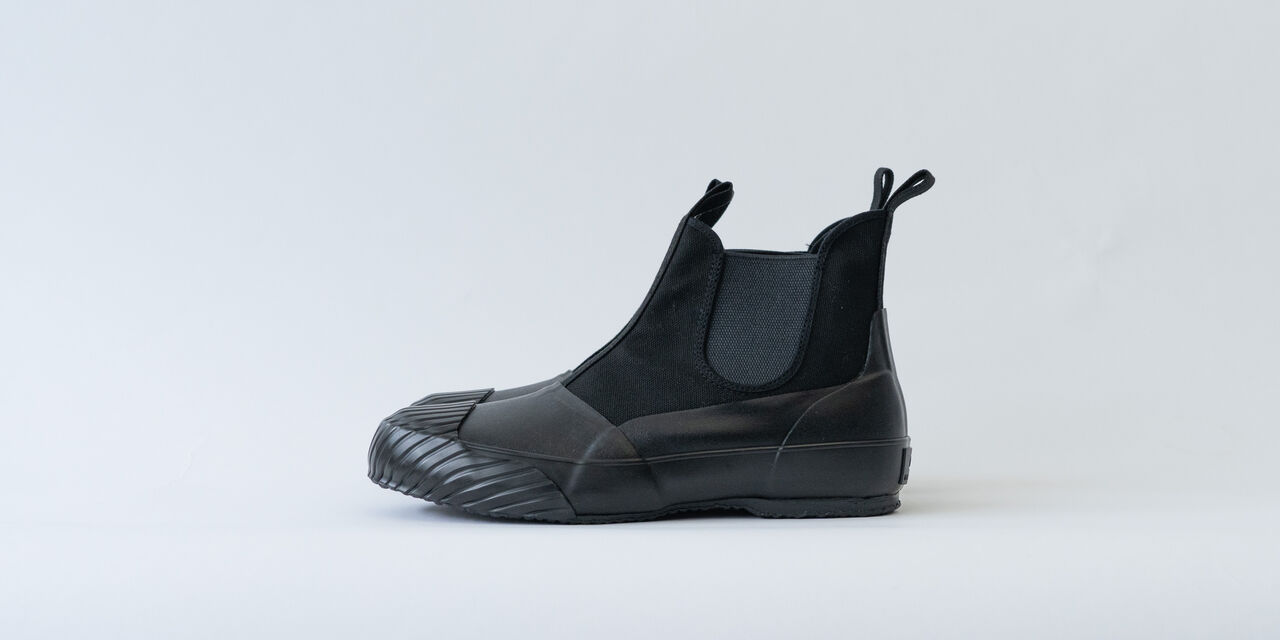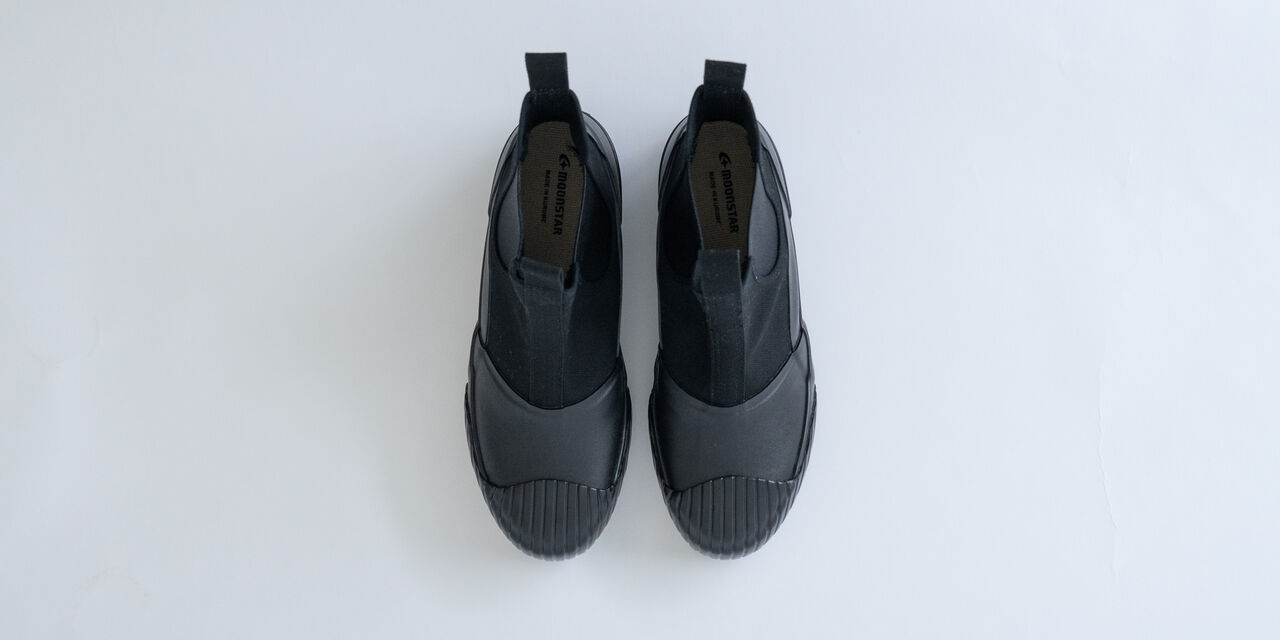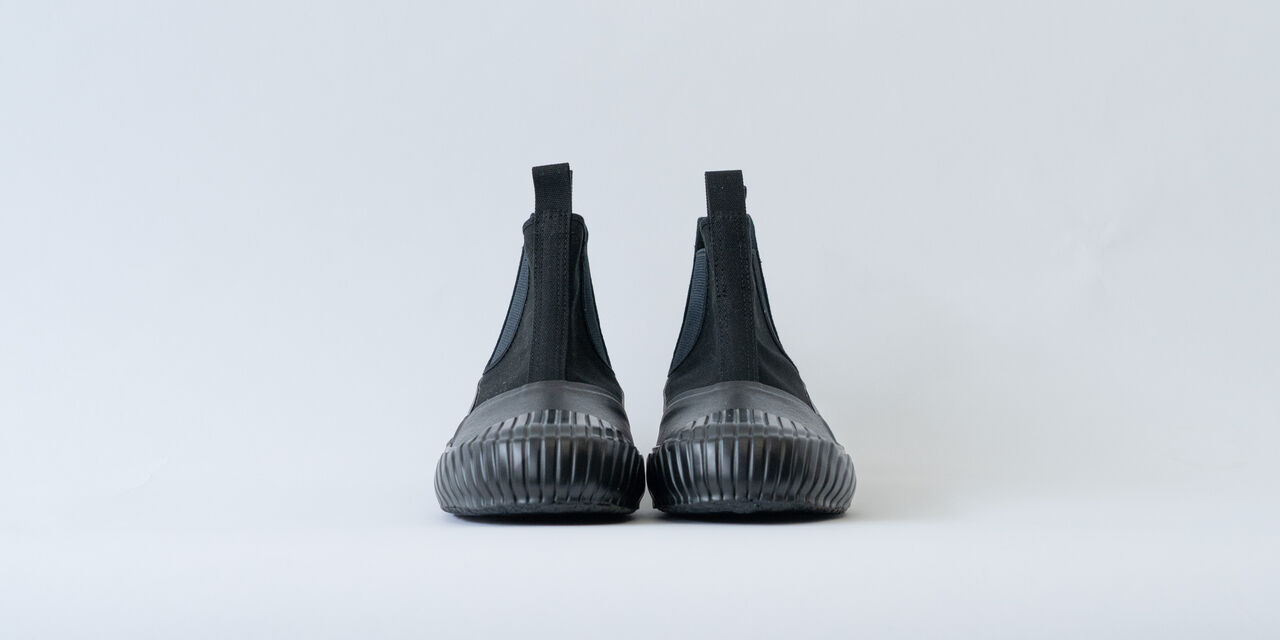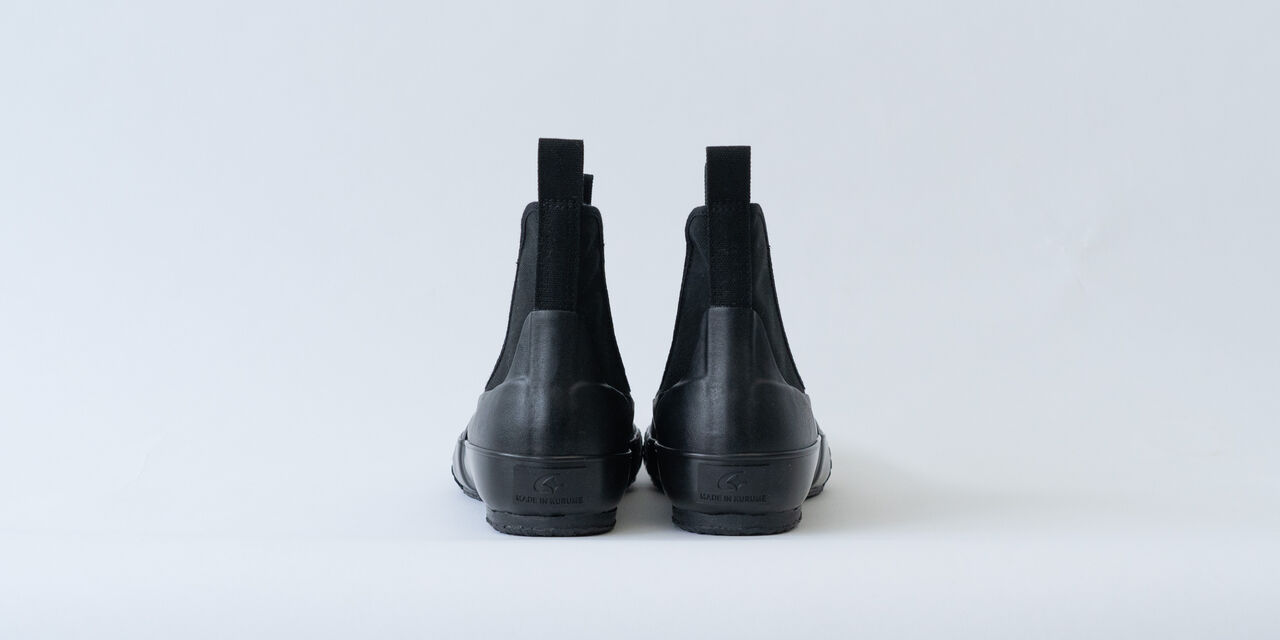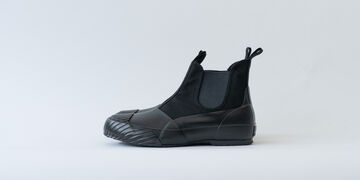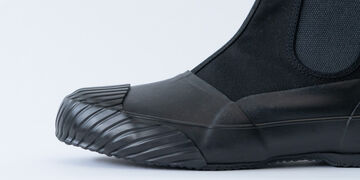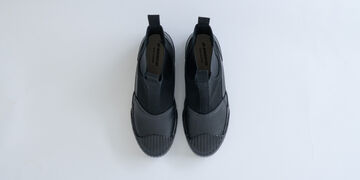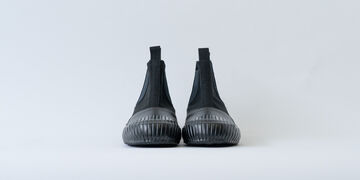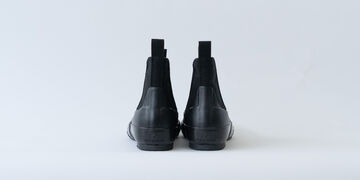MoonStar
ALW SIDEGOA
Made in
Japan
New
Large Item
Low in Stock
Sold Out
This product is not available in your market
Color
Black
Khaki
2020000300844
All-Weather Footwear for Easy On/Off
The "ALW SIDEGOA" series can be worn on a sunny day and even in the rain with the "vulcanized method" (bonding the rubber to the canvas upper). This method makes it possible to create shoes that have a strong bond between the different materials and have a flexible sole that does not come off easily.

Attention to detail, perfected in-house.
MoonStar has been manufacturing shoes for more than 150 years in Kurume, Fukuoka, a rubber industry town that flourished with the production of Tabi Shoes. Moonstar's factory, which carries out nearly all of its processes on its own premises, has become integrated into the community, resembling a town that provides livelihoods and jobs for many people.

The factory is marked by a brand logo that expresses the "moon and star" that is also the company's name. The site includes buildings with triangular roofs, which are rare in Japan today, and others that are more than 100 years old. In the shoe manufacturing process, shoe molds are usually made by machine from data created on a PC, but at MoonStar, craftsmen add even finer details to the mold base, one by one, by hand. By successfully combining machine and hand work in this way, the product is not only elaborate, but also finished as a product with added craftsmanship.
During our interviews with the factories and craftsmen, we felt that they were striving for comfort for the wearer and quality as a product that is part of everyday life. We believe that the balance between machine and hand techniques, cultivated over a long history, is behind the creation of products that are elaborate, beautiful, nostalgic and full of warmth.
The "ALW SIDEGOA" series can be worn on a sunny day and even in the rain with the "vulcanized method" (bonding the rubber to the canvas upper). This method makes it possible to create shoes that have a strong bond between the different materials and have a flexible sole that does not come off easily.

Attention to detail, perfected in-house.
MoonStar has been manufacturing shoes for more than 150 years in Kurume, Fukuoka, a rubber industry town that flourished with the production of Tabi Shoes. Moonstar's factory, which carries out nearly all of its processes on its own premises, has become integrated into the community, resembling a town that provides livelihoods and jobs for many people.

The factory is marked by a brand logo that expresses the "moon and star" that is also the company's name. The site includes buildings with triangular roofs, which are rare in Japan today, and others that are more than 100 years old. In the shoe manufacturing process, shoe molds are usually made by machine from data created on a PC, but at MoonStar, craftsmen add even finer details to the mold base, one by one, by hand. By successfully combining machine and hand work in this way, the product is not only elaborate, but also finished as a product with added craftsmanship.
During our interviews with the factories and craftsmen, we felt that they were striving for comfort for the wearer and quality as a product that is part of everyday life. We believe that the balance between machine and hand techniques, cultivated over a long history, is behind the creation of products that are elaborate, beautiful, nostalgic and full of warmth.
Size: 23cm(9inches)/US4-5
Material: Canvas (Upper), Synthetic rubber (Sole)
Material: Canvas (Upper), Synthetic rubber (Sole)
MoonStar
In 1873, a founder focused on traditional Japanese tabi socks and established the forerunner of 'Moonstar' called 'Tsuchiya tabi'. The third generation president, inspired by American canvas shoes, began research. Two years later, he successfully created a prototype by combining fabric and rubber soles. Over time, these evolved into athletic shoes and rubber boots, and finally into sports shoes in the 1950s.
Since the 1980s, production has shifted to overseas factories, while domestic factories have declined. However, since in 2013, Moonstar has launched the "FINE VULCANIZED" series, which draws on the skilled craftsmanship of domestic factories, with a special focus on the "vulcanized method."
Kurume City, a thriving center of the rubber industry has been making shoes for over 140 years. Moonstar's factory, which carries out nearly all of its processes on its own premises, has become integrated into the community, resembling a town that provides livelihoods and jobs for many people.
In 1873, a founder focused on traditional Japanese tabi socks and established the forerunner of 'Moonstar' called 'Tsuchiya tabi'. The third generation president, inspired by American canvas shoes, began research. Two years later, he successfully created a prototype by combining fabric and rubber soles. Over time, these evolved into athletic shoes and rubber boots, and finally into sports shoes in the 1950s.
Since the 1980s, production has shifted to overseas factories, while domestic factories have declined. However, since in 2013, Moonstar has launched the "FINE VULCANIZED" series, which draws on the skilled craftsmanship of domestic factories, with a special focus on the "vulcanized method."
Kurume City, a thriving center of the rubber industry has been making shoes for over 140 years. Moonstar's factory, which carries out nearly all of its processes on its own premises, has become integrated into the community, resembling a town that provides livelihoods and jobs for many people.
・Please avoid crushing or stepping on the heel area as this may cause deformation, damage or shoe blisters.
・Avoid use in areas with solvents such as oil or thinner.
・Do not dry in direct sunlight or high temperatures such as stoves or hair dryers.
・Please do not store in wet conditions, in a bent position, or in hot and humid places. This can cause the sole to peel off, deteriorate, and deform.
・White powder may appear on the rubber surface (bloom phenomenon). Use the water-based rubber wax with a soft cloth to wipe it off.
・If you feel any abnormality in your feet, discontinue use immediately. (*Sweating or individual constitution may cause itching or irritation.)
・If the pattern on the bottom of the sole fades in certain areas, the anti-slip effect is reduced and the sole becomes slippery. We recommend replacing the shoe with a new pair.
・Avoid use in areas with solvents such as oil or thinner.
・Do not dry in direct sunlight or high temperatures such as stoves or hair dryers.
・Please do not store in wet conditions, in a bent position, or in hot and humid places. This can cause the sole to peel off, deteriorate, and deform.
・White powder may appear on the rubber surface (bloom phenomenon). Use the water-based rubber wax with a soft cloth to wipe it off.
・If you feel any abnormality in your feet, discontinue use immediately. (*Sweating or individual constitution may cause itching or irritation.)
・If the pattern on the bottom of the sole fades in certain areas, the anti-slip effect is reduced and the sole becomes slippery. We recommend replacing the shoe with a new pair.
All-Weather Footwear for Easy On/Off
The "ALW SIDEGOA" series can be worn on a sunny day and even in the rain with the "vulcanized method" (bonding the rubber to the canvas upper). This method makes it possible to create shoes that have a strong bond between the different materials and have a flexible sole that does not come off easily.

Attention to detail, perfected in-house.
MoonStar has been manufacturing shoes for more than 150 years in Kurume, Fukuoka, a rubber industry town that flourished with the production of Tabi Shoes. Moonstar's factory, which carries out nearly all of its processes on its own premises, has become integrated into the community, resembling a town that provides livelihoods and jobs for many people.

The factory is marked by a brand logo that expresses the "moon and star" that is also the company's name. The site includes buildings with triangular roofs, which are rare in Japan today, and others that are more than 100 years old. In the shoe manufacturing process, shoe molds are usually made by machine from data created on a PC, but at MoonStar, craftsmen add even finer details to the mold base, one by one, by hand. By successfully combining machine and hand work in this way, the product is not only elaborate, but also finished as a product with added craftsmanship.
During our interviews with the factories and craftsmen, we felt that they were striving for comfort for the wearer and quality as a product that is part of everyday life. We believe that the balance between machine and hand techniques, cultivated over a long history, is behind the creation of products that are elaborate, beautiful, nostalgic and full of warmth.
The "ALW SIDEGOA" series can be worn on a sunny day and even in the rain with the "vulcanized method" (bonding the rubber to the canvas upper). This method makes it possible to create shoes that have a strong bond between the different materials and have a flexible sole that does not come off easily.

Attention to detail, perfected in-house.
MoonStar has been manufacturing shoes for more than 150 years in Kurume, Fukuoka, a rubber industry town that flourished with the production of Tabi Shoes. Moonstar's factory, which carries out nearly all of its processes on its own premises, has become integrated into the community, resembling a town that provides livelihoods and jobs for many people.

The factory is marked by a brand logo that expresses the "moon and star" that is also the company's name. The site includes buildings with triangular roofs, which are rare in Japan today, and others that are more than 100 years old. In the shoe manufacturing process, shoe molds are usually made by machine from data created on a PC, but at MoonStar, craftsmen add even finer details to the mold base, one by one, by hand. By successfully combining machine and hand work in this way, the product is not only elaborate, but also finished as a product with added craftsmanship.
During our interviews with the factories and craftsmen, we felt that they were striving for comfort for the wearer and quality as a product that is part of everyday life. We believe that the balance between machine and hand techniques, cultivated over a long history, is behind the creation of products that are elaborate, beautiful, nostalgic and full of warmth.
Size: 23cm(9inches)/US4-5
Material: Canvas (Upper), Synthetic rubber (Sole)
Material: Canvas (Upper), Synthetic rubber (Sole)
MoonStar
In 1873, a founder focused on traditional Japanese tabi socks and established the forerunner of 'Moonstar' called 'Tsuchiya tabi'. The third generation president, inspired by American canvas shoes, began research. Two years later, he successfully created a prototype by combining fabric and rubber soles. Over time, these evolved into athletic shoes and rubber boots, and finally into sports shoes in the 1950s.
Since the 1980s, production has shifted to overseas factories, while domestic factories have declined. However, since in 2013, Moonstar has launched the "FINE VULCANIZED" series, which draws on the skilled craftsmanship of domestic factories, with a special focus on the "vulcanized method."
Kurume City, a thriving center of the rubber industry has been making shoes for over 140 years. Moonstar's factory, which carries out nearly all of its processes on its own premises, has become integrated into the community, resembling a town that provides livelihoods and jobs for many people.
In 1873, a founder focused on traditional Japanese tabi socks and established the forerunner of 'Moonstar' called 'Tsuchiya tabi'. The third generation president, inspired by American canvas shoes, began research. Two years later, he successfully created a prototype by combining fabric and rubber soles. Over time, these evolved into athletic shoes and rubber boots, and finally into sports shoes in the 1950s.
Since the 1980s, production has shifted to overseas factories, while domestic factories have declined. However, since in 2013, Moonstar has launched the "FINE VULCANIZED" series, which draws on the skilled craftsmanship of domestic factories, with a special focus on the "vulcanized method."
Kurume City, a thriving center of the rubber industry has been making shoes for over 140 years. Moonstar's factory, which carries out nearly all of its processes on its own premises, has become integrated into the community, resembling a town that provides livelihoods and jobs for many people.
・Please avoid crushing or stepping on the heel area as this may cause deformation, damage or shoe blisters.
・Avoid use in areas with solvents such as oil or thinner.
・Do not dry in direct sunlight or high temperatures such as stoves or hair dryers.
・Please do not store in wet conditions, in a bent position, or in hot and humid places. This can cause the sole to peel off, deteriorate, and deform.
・White powder may appear on the rubber surface (bloom phenomenon). Use the water-based rubber wax with a soft cloth to wipe it off.
・If you feel any abnormality in your feet, discontinue use immediately. (*Sweating or individual constitution may cause itching or irritation.)
・If the pattern on the bottom of the sole fades in certain areas, the anti-slip effect is reduced and the sole becomes slippery. We recommend replacing the shoe with a new pair.
・Avoid use in areas with solvents such as oil or thinner.
・Do not dry in direct sunlight or high temperatures such as stoves or hair dryers.
・Please do not store in wet conditions, in a bent position, or in hot and humid places. This can cause the sole to peel off, deteriorate, and deform.
・White powder may appear on the rubber surface (bloom phenomenon). Use the water-based rubber wax with a soft cloth to wipe it off.
・If you feel any abnormality in your feet, discontinue use immediately. (*Sweating or individual constitution may cause itching or irritation.)
・If the pattern on the bottom of the sole fades in certain areas, the anti-slip effect is reduced and the sole becomes slippery. We recommend replacing the shoe with a new pair.
